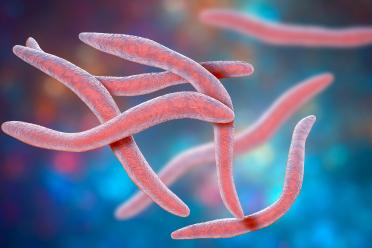
The scientists identified five types of bacteria which were common in urine and tissue samples from men with aggressive prostate cancer. It is hoped that these findings could help pave the way for treatments that could target these particular bacteria and slow or prevent the development of aggressive disease.
Project lead Professor Colin Cooper from UEA’s Norwich Medical School, said: “We already know of some strong associations between infections and cancer. For example, the presence of Helicobacter pylori bacteria in the digestive tract can lead to stomach ulcers and is associated with stomach cancer, and some types of the HPV virus can cause cervical cancer.
“We wanted to find out whether bacteria could be linked to the way prostate cancer grows and spreads.”
Dr Jeremy Clark, also from UEA’s Norwich Medical School, said: “While prostate cancer is responsible for a large proportion of all male cancer deaths, it is more commonly a disease men die with rather than from.
“And little is known about what causes some prostate cancers to become more aggressive than others. We now have evidence that certain bacteria are involved in this and are part of the puzzle.”
The team worked with colleagues at the Norfolk and Norwich University Hospital, the Quadram Institute, Earlham Institute and other collaborators to analyse urine or tissue samples from more than 600 patients with or without prostate cancer. And they developed methods of finding the bacteria associated with aggressive prostate cancer.
Dr Rachel Hurst, first author of this work and also from UEA’s Norwich Medical School, said: “To detect the bacteria, we used many different approaches including whole genome sequencing of the tissue samples, a method which is being used increasingly as we transition into an era of genomic medicine.
“When tumour samples are sequenced, DNA from any pathogens present are also sequenced, making it possible to detect bacteria.
“We found several types of bacteria associated with aggressive prostate cancer, some of which are new types of bacteria never found before.”.
Two of the new bacteria species found by the team have been named after two of the study’s funders - Porphyromonas bobii, after the The Bob Champion Cancer Trust and Varibaculum prostatecancerukia, after Prostate Cancer UK.
The set of bacteria found by the team include Anaerococcus, Peptoniphilus, Porphyromonas, Fenollaria and Fusobacterium. All of these are anaerobic, which means they like to grow without oxygen present.
Prof Daniel Brewer, from UEA’s Norwich Medical School and a visiting worker at the Earlham Institute, said: “Knowing when we can watch and wait or whether we need to start treatment is a major challenge for people with prostate cancer. If we can target aggressive cancers while sparing others from unnecessary treatment it will dramatically improve the way we manage this disease.
“There seems to be a clear link between these bacteria and the way the cancer is behaving. We need to understand this relationship in more detail but it’s a major step towards developing a cheap and quick test that could guide treatment decisions.”
